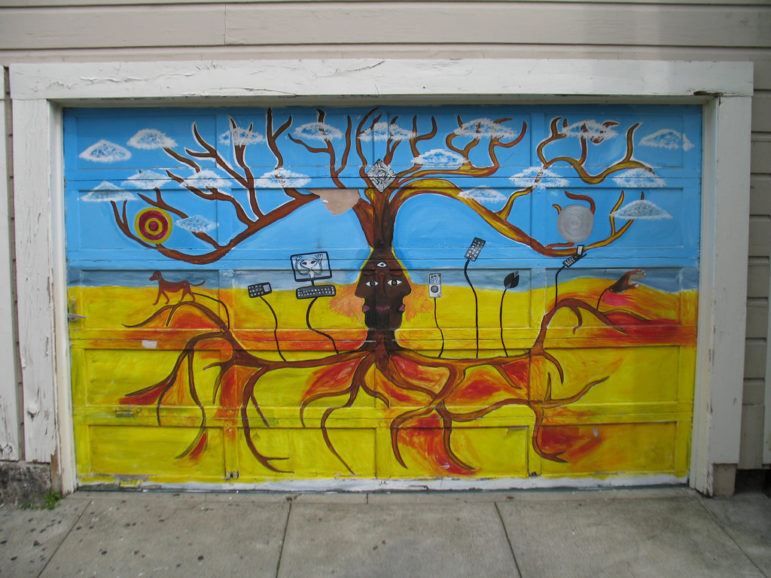
July 1, 2016; The Guardian
The Guardian features a story by Julia Carrie Wong called “‘Tech tax’: San Francisco mulls plan for taxing the rich to house the poor,” which describes a new proposal by a San Francisco supervisor, Eric Mar, to levy a 1.5 percent tax on the tech giants based in San Francisco. The proposed new tax comes in the context of an ongoing Big Tech-Townie controversy, and would fly in the face of concessions granted just five years ago when the techies threatened to leave SF for communities with lower taxes and lower rents. At that time, the city responded with tax breaks that not only discouraged firms from leaving, but also attracted new firms to set up in the city by the Bay. Targets of the proposed tax (and the public’s enmity) include Google, Twitter, Uber, Airbnb and Salesforce.
Ms. Wong’s article highlights a kaleidoscope of populist responses to Bay Area inequality, from the Google employee who passes out food left over from a charity event to homicidal graffiti on city lampposts. The depths of the divisions as portrayed in Ms. Wong’s article are stark: “It is a city where 57.4 percent of homes are worth more than $1m, but hundreds of people sleep in tents on the street every night.” Meanwhile, elected officials seem staunchly opposed to taxing the techies, and the corporations seem to prefer voluntary charity to tax increases.
A different article, “Techies and the Homeless: Frenemies Forever?” from online magazine Backchannel, profiles San Francisco’s newly appointed homelessness czar, Jeff Kositsky , the former director of San Francisco’s Hamilton Family Center, and his plans to address the problem of homelessness. It describes Kositsky’s success at Hamilton Family Center as built around long-term commitments from the tech giants to building systems, rather than one-time “Daddy Warbucks” gifts.
While tech donors are in every San Francisco fundraiser’s Rolodex, Kositsky spent the last years actually leveraging tech’s money and its outcomes-based mentality to the advantage of the Hamilton Family Center, which whisks homeless families into housing or a shelter.
Sign up for our free newsletters
Subscribe to NPQ's newsletters to have our top stories delivered directly to your inbox.
By signing up, you agree to our privacy policy and terms of use, and to receive messages from NPQ and our partners.
Here’s the dilemma for each side in the “Townies v. Tech” standoff. The populists are just contrary: They know what they are against and who’s to blame, but have no clear plans to transform the situation. This is characteristic of “populist” uprisings, which are strong on emotion and symbolism and short on solutions. In Saul Alinsky’s Rules for Radicals, the father of modern community organizing advises organizers with rule #12: “The price of a successful attack is a constructive alternative. Never let the enemy score points because you’re caught without a solution to the problem.”
The dilemma for city planners and Big Tech donors is that there is no one-shot, short-term, high visibility intervention that will make a difference for rent-burdened tenants and homeless people on the streets. Building solutions takes time and consensus. The article in Backchannel describes Kositsky’s new job this way: “He’ll be situated at the top of a brand-new mega department, conjoining parts of what were once three disparate city offices, but he’ll still be answering to the mayor while wrangling 110 employees and a $165 million budget. Will he be able to scale the tech investment for the city writ large?” Can he scale up in an environment where he’s an appointee with no political base of his own?
Here’s where a community of pioneering advocates could be helpful as a mediating force between Big Tech and the Townies. It’s a role that settlement houses once played. Robert H. Bremner in From the Depths: Discovery of Poverty in the United States writes of the settlement movement, “Jacob Riis called the settlement houses fulcrums for the lever of reform and testified whenever a good cause was proposed, the settlements contributed ‘young enthusiasts to collect the facts’ and urge them on reluctant city officials.”
Given Millennials’ interest in personal charity, a 21st-century version of the settlement movement could work again. Maybe Hands On Bay Area could morph into a role like this, if there were a vision that moved beyond “helping hands” to building relationships with the poor and homeless and built civic empowerment alternatives. Instead of handing out leftover food to passersby in front of the Twitter headquarters, young people could be researching the inside of the poverty experience as a basis for transformational reforms like those proposed by Matthew Desmond, who was a self-help “settler” among the poor renters of Milwaukee. Imagine if Google, Twitter, Uber, Airbnb, and Salesforce, influenced by an alliance of populists and young activists, decided to spend lobbying dollars—not charity dollars—on proposals like universal housing vouchers, eviction representation, housing and legal court reforms, or Universal Basic Income. That’s populism with an agenda for change.—Spencer Wells













